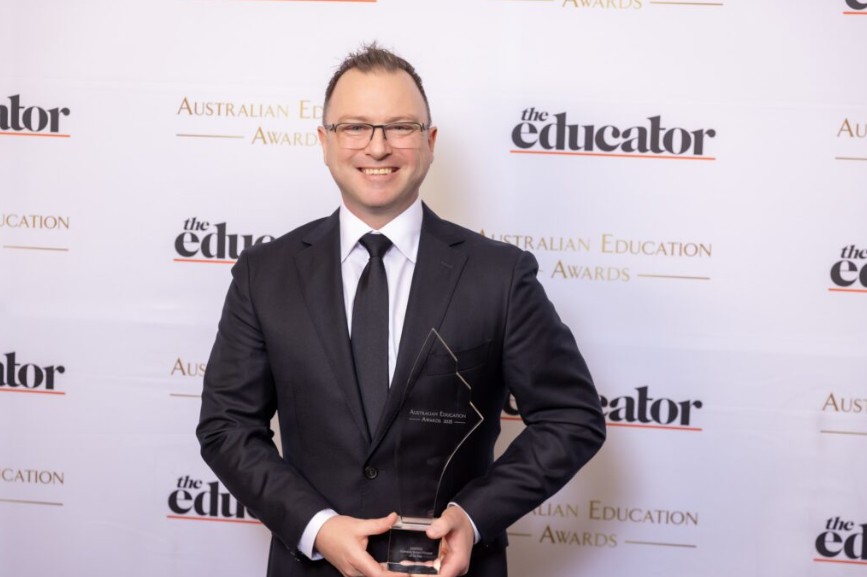
Dr Adrian Camm isn’t just passionate about education – he’s passionate about empowering the people around him who live and breathe it in their day-to-day work.
As principal of Westbourne Grammar School, Dr Camm has redefined what leadership looks like through a forward-thinking distributed leadership model, ensuring every staff member has a voice, a purpose, and a pathway to make meaningful change.
By flattening hierarchies and amplifying voices across the school, this approach has sparked cultural transformation—laying the groundwork for national recognition and setting a benchmark for school leadership in the 21st Century.
At the Australian Education Awards 2025 on Friday 8 August, Dr Camm was recognised as the Compass Australian School Principal of the year, also bagging several other awards on behalf of his school.
Westbourne Grammar took home the School Principal of the Year – Non-government and Innovation in Curriculum Design accolades, including Excellence Awards in the categories of Best Use of Technology, Innovation in Learning Environment Design and Best School Strategic Plan.
‘Great school leaders embrace people first’
In an interview with The Educator following the Awards, Dr Camm said great school leaders of today adopt a pedagogy of listening and use what they hear to shape their school for the better.
“Great school leaders embrace people first,” Dr Camm told The Educator. “They grow and empower people, elevate the profession publicly, and provide pathways that retain and attract talent.”
Another key attribute of a great school leader, says Dr Camm, is challenging the status quo.
“They think differently and are not constrained by the structuring structures of the world around them – they push through perceived and real barriers in order to achieve better outcomes for their community,” he said.
“Great leaders also respect the history and tradition of their schools and yet, they think systemically, embrace innovation, and are constantly looking to the future, ensuring they are engaging and inspiring the eager young minds of tomorrow.”
‘People understand there is a pathway for them at the school’
Dr Camm said distributed leadership at Westbourne has lifted wellbeing, retention and culture.
“By spreading decision-making across the school, we have reduced bottlenecks, accelerated change, and staff are contributing to the advancement of the school in many different ways,” he said.
“Workloads are more balanced, timelines are shaped by those closest to the work, and workplace flexibility has contributed to a psychologically safe environment.”
Dr Camm said staff retention is stronger at Westbourne Grammar because people understand that there is a pathway for them here at the school.
“Our attrition is as low as it has ever been. We continue to attract the very best people who want to work here,” he said. “Culture has improved dramatically over the last 4 years as people are seen, heard, and valued.”
Dr Camm said the school measures all this in a variety of ways.
“One of the most compelling anecdotes is the fact we had 45 staff on our digital transformation committee,” he said.
“Via our distributed leadership model, everyone on this committee, whether you were a Year 2 teacher, or our Database Manager, was given the end to end responsibility for the delivery of a key strategic priority.”
Dr Camm said this empowers staff, building their capacity, confidence, and connectedness to the school while also accelerating positive change.
People will need to be a strategic focus for leaders
Amidst a changing economic, political, and social landscape, there are many challenges that will continue over the next 5 to 10 years, says Dr Camm.
“Teacher, student and principal wellbeing continues to be an issue for schools,” he said. “Teacher shortages are endemic in some areas, exacerbated by the constant negative rhetoric from some media outlets, positioning teachers and schools as the ones to blame for anything and everything.”
Despite the challenges, Dr Camm believes it is the most exciting time in history to be leading and teaching in schools.
“I am an optimist, and the future is arriving faster than we think,” he said. “The advancement of AI is the biggest technological transformation the world has seen since the widespread adoption of the internet, so whether we like it or not, it is here to stay and we need to adapt.”
Dr Camm said while schools must continue providing young people with opportunities to learn languages, philosophy, music, and the arts, they must also think beyond the curricula of the last 100 years to maintain relevance.
“That’s how we honour our heritage and deliver for today’s and tomorrow’s families,” he said. “The next decade will demand more from school leaders perhaps than in any time before.”
Dr Camm said people will need to be a strategic focus for leaders.
“Indeed, people will increasingly become the strategy. Place, in terms of facilities and culture, will become the enabler and programs, the unique promise,” he said.
The best leaders over the next decade will be the best learners and those who build the very best teams of people. The best leaders will then get out of their way enabling them to do their best work.”

